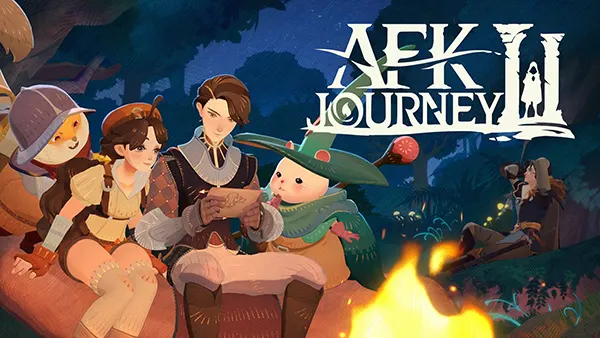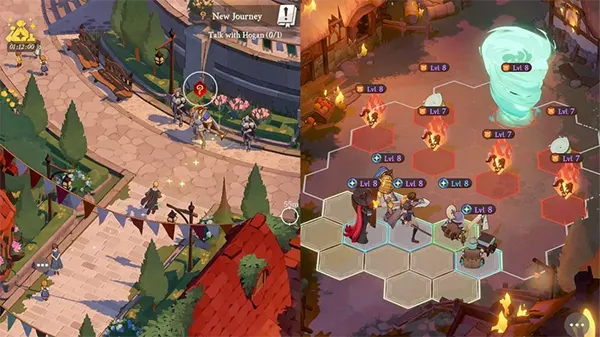
AFK Journey — the Ideal Successor to AFK Arena with an Open World
AFK Journey, the long-awaited continuation of the widely acclaimed AFK Arena, offers a refined experience for fans of idle RPGs. Developed by Lilith Games and FARLIGHT, it maintains the core elements of its predecessor while introducing a dynamic open world, expanded lore, and strategic enhancements. Released globally in early 2025, the game is available on iOS, Android, and PC, ensuring accessibility for a wide player base. With its refined mechanics and immersive storytelling, AFK Journey positions itself not as just a sequel, but as a thoughtful evolution of the franchise.
The World of Esperia: Familiar Yet Vastly Expanded
The story in AFK Journey returns players to Esperia, a realm filled with magic, conflict, and mythical heroes. Unlike the limited exploration zones of AFK Arena, AFK Journey introduces a fully explorable open world where each region offers unique biomes, enemies, and lore-based side quests. This open approach not only adds depth to the narrative but also enhances player agency, allowing for non-linear progression and discoveries.
Each area of Esperia has been meticulously designed to offer its own challenges and rewards. From icy wastelands to dense jungles, the level design is diverse and encourages tactical thinking. Exploration is rewarded with hidden treasures, character backstories, and artefacts that impact combat efficiency and team synergy. The map itself evolves with the story, unlocking new regions as players progress, which maintains a strong sense of adventure throughout.
Moreover, the game supports a seamless transition between zones, which avoids repetitive loading screens and keeps the pace of gameplay fluid. This design choice enhances immersion and brings the AFK franchise into line with modern RPG standards.
Storytelling and World-Building with Purpose
AFK Journey’s narrative is interwoven with deep character development and a broader conflict that extends beyond the central protagonist. Players can choose to follow the main questline or branch out into side missions that expand on the personal stories of allies and antagonists alike. This structure not only enriches the lore but also reinforces emotional investment in the outcomes of the game.
Recurring characters from AFK Arena appear with new roles, backstories, and motivations. The continuity creates a sense of legacy while offering newcomers a coherent entry point. Voice acting and in-game cutscenes further develop relationships and tensions among factions, grounding the fantasy in human emotion and choice-driven consequences.
World-building is subtle but effective. In-game books, dialogues, and environment details build a complex ecosystem without overwhelming exposition. Players organically learn about the world through interaction rather than text dumps, making the experience richer and more natural.
Revamped Combat and Team Synergy
Combat in AFK Journey expands upon the auto-battle mechanics of its predecessor with the addition of manual skill activation and battlefield positioning. This gives players greater control over outcomes, particularly in difficult boss fights and arena challenges. The grid-based format encourages strategy, rewarding players who understand skill rotation and formation dynamics.
Heroes are now more than just units; they are customisable through skill trees, gear loadouts, and affinity bonds. Each hero fits into one of several roles—tank, support, DPS, or specialist—and synergy between units plays a critical role in success. Unlike AFK Arena, where power rating often dominated, AFK Journey places higher value on team composition and strategy.
Additionally, the AI behind enemy units is more reactive and intelligent. Enemies adapt to patterns, requiring players to adjust their approach frequently. These changes make the gameplay loop more engaging and reduce the predictability that can plague idle RPGs over time.
Idle Mechanics Meet Active Strategy
AFK Journey continues to embrace its roots with idle progression mechanics, allowing players to collect resources and experience even while offline. However, the integration of strategic gameplay ensures that returning players have meaningful choices to make when they log back in. This balance keeps both casual and invested players satisfied.
Offline rewards are now tied to location and progression within the story. The deeper you venture into the world, the greater your passive rewards. This encourages exploration without punishing players who prefer shorter gaming sessions, making it an ideal mobile experience for various lifestyles.
Moreover, boss battles and special events require real-time decision-making. These encounters are designed to challenge players, offering rare loot and lore fragments as rewards. The blend of idle and active components reflects the evolving nature of mobile gaming preferences in 2025.

Community Integration and Cross-Platform Accessibility
Recognising the importance of player interaction, AFK Journey includes robust guild features, global chat systems, and seasonal events. Players can collaborate to defeat world bosses or compete in ranked PvP ladders. Guild raids and territory control mechanics foster cooperation, adding depth beyond the single-player experience.
Cross-platform functionality ensures that progress is shared across devices. Whether playing on mobile during a commute or switching to PC for a longer session, the experience remains uninterrupted. This feature addresses a major limitation of AFK Arena and reflects modern expectations of cross-device continuity in 2025.
The game’s economy has also been refined. While microtransactions exist, the balance between free and paid content is handled transparently. Premium items are largely cosmetic or tied to quality-of-life improvements rather than power spikes, which helps maintain fairness and user trust.
A Vision for Long-Term Engagement
AFK Journey’s live-service roadmap includes regular content updates, character additions, and seasonal arcs. This ensures that the game remains fresh and encourages players to return. The developers are also actively engaged with community feedback through social media and in-game surveys, allowing adjustments to be made swiftly and transparently.
Esports potential has been hinted at through the addition of competitive events and spectator modes. While still in early development, this could position AFK Journey as a leader in the mobile strategy RPG space in the coming years. The game’s polished presentation and balance mechanics make it a strong candidate for future competitive formats.
By building upon the strong foundation of AFK Arena and adding features requested by the community, AFK Journey offers not just a sequel but a genuinely modern RPG tailored to both the casual and core gaming audience. It sets a new standard for idle RPGs going forward.
